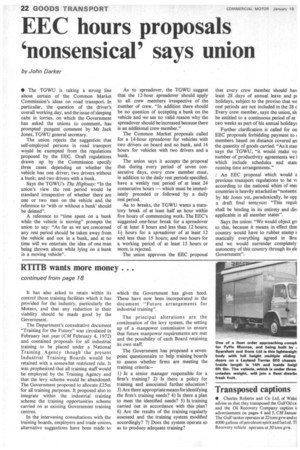EEC hours proposals 'nonsensical' says union
Page 24

If you've noticed an error in this article please click here to report it so we can fix it.
by John Darker
• The TGWU is taking a strong line about certain of the Common Market Commission's ideas on road transport. In particular, the question of the driver's overall working day, and the issue of sleeping cabs in lorries, on which the Government has asked the unions to comment, has prompted pungent comment by Mr Jack Jones, TGWU general secretary.
The union rejects the suggestion that self-employed persons in road transport would be exempted from the regulations proposed by the EEC. Draft regulations .drawn up by the Commission specify three cases depending on whether the vehicle has one driver; two drivers without a bunk; and two drivers with a bunk.
Says the TGWU's The Highway: "In the union's view the rest period would be standard irrespective of whether there are one or two men on the vehicle and the reference to 'with or without a bunk' should be deleted".
A reference to "time spent on a bunk while the vehicle is moving" prompts the union to say: "As far as we are concerned any rest period should be taken away from the vehicle and not in a bunk, and at no time will we entertain the idea of one man being thrown about while lying on a bunk in a moving vehicle". As to spreadover, the TGWU suggest that the 12-hour spreadover should apply to all crew members irrespective of the number of crew. "In addition there should be no question of accepting a bunk on the vehicle and we see no valid reason why the spreadover should be increased because there is an additional crew member."
The Common Market proposals called for a 14-hour spreadover for vehicles with two drivers on board and no bunk, and 16 hours for vehicles with two drivers and a bunk.
The union says it accepts the proposal that during every period of seven consecutive days, every crew member must, in addition to the daily rest periods specified, have a weekly rest period of at least 24 consecutive hours — which must be immediately preceded or followed by a daily rest period.
As to breaks, the TGWU wants a statutory break of at least half an hour within five hours of commencing work. The EEC's suggested one-hour break for a spreadover of at least 8 hours and less than 12 hours; 1+ hours for a spreadover of at least 12 and less than 15 hours; and two hours for a, working period of at least 15 hours or more, is rejected.
The union approves the EEC proposal that every crew member should hay least 28 days of annual leave and pi holidays, subject to the proviso that we rest periods are not included in the 28 d Every crew member, says the union, sh be entitled to a continuous period of at two weeks as part of his annual holidays Further clarification is called for on EEC proposals forbidding payment to < members based on distance covered an the quantity of goods carried. "As it stan says the TGWU, "it would make vo number of productivity agreements we I which include schedules and stara running time arrangements."
: An EEC proposal which would a previous transport regulations to be 14 according to the national whim of mei countries is heavily-attacked as "nonsensi by Mr Jones yet, paradoxically, he opr a draft final sentence: "This reguh
shall be binding in its entirety and din applicable in all member states".
Says the union: "We would object gri to this, because it means in effect that country would have to rubber stamp s matically everything agreed in Bru and we would surrender completely autonomy of this country through its ale Government".




















































































































